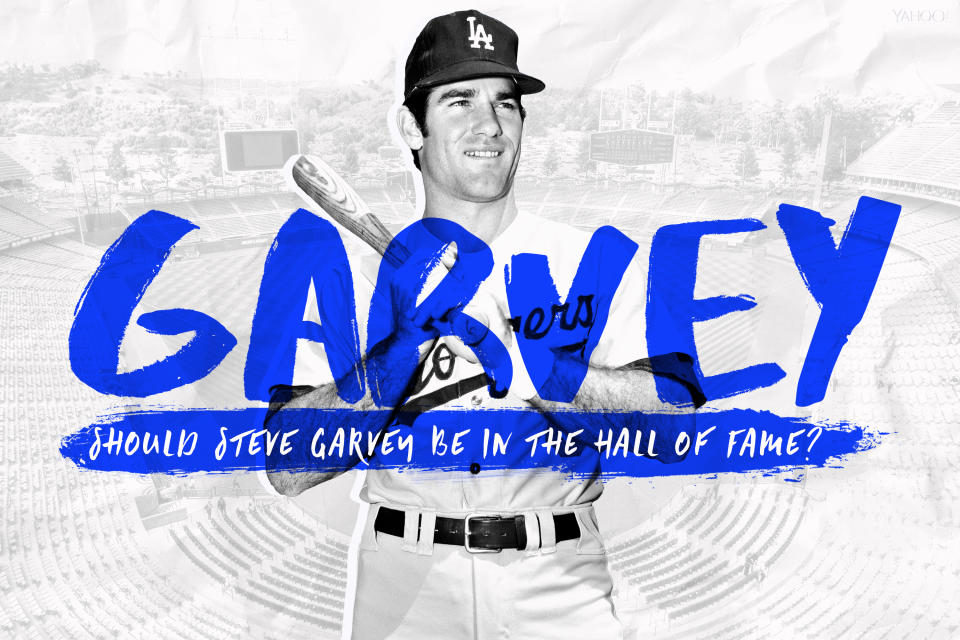Should Steve Garvey be in the Hall of Fame?
Editor’s note: This is the first installment of a daily series looking at players on the Modern Era Hall of Fame ballot, which will be voted on Dec. 10. We’ll look at the cases of all 10 people on the ballot and offer our takes on their candidacy.
Steve Garvey has a lot to be proud of from this Major League Baseball career. He has accolades and All-Star games and trophies and a stat sheet that is very full. It’s enough to make him one of the Los Angeles Dodgers’ legends.
One thing that’s eluded Garvey, however, is the Hall of Fame.
That’s the case with the nine other men on the Modern Era ballot too. If their Hall of Fame cases look and sound familiar — we’re looking at you, Jack Morris, Dale Murphy and Alan Trammell — it’s because they’ve been examined closely and recently. This ballot, however, puts the power in the hand of a different electorate, as the Hall of Fame’s Era ballots are cast by a group of 16 Hall of Famers and veteran voters. They’re allowed to vote for up to four candidates of the 10 on the ballot. Twelve of the possible 16 ballots are needed for induction.
Garvey’s credentials are good, there’s no doubt, but they weren’t enough for the writers and he has to be considered something of a longshot here. He does check some big boxes: He won an MVP award, was on eight straight All-Star teams, hit .294 for his career and had a long and durable career — 19 seasons and 2,332 games played — but there are holes in candidacy too.
Let’s examine his case a little further and see whether the Big League Stew writers give Garvey their unofficial yay or nay.

LAST TIME ON THE BALLOT
The last time Garvey appeared on the Baseball Writers Association of America ballot was 2007, when he received 21.1 percent of the vote. That’s not even close to the 75 percent needed for induction. Garvey’s best ballot year came in 1995 with 42.6 percent, but in 15 years on the ballot, he only got more than 40 percent three times.

PROS
• Garvey’s longevity might be one of his biggest assets. Playing 19 seasons and playing 1,207 straight games at one point, might make his career seem bigger than a closer look at his numbers reveals. He played in three different decades.
• His .294 batting average is favorable, as is his streak of eight straight All-Star appearances. He made 10 overall. He won a World Series and two NLCS MVPs. Plus, as noted above, he was the 1974 MVP.
• Of the Hall of Fame measurements out there, Bill James’ Hall of Fame Monitor score is very favorable to Garvey. It puts his career at 130, whereas 100 means you’re a “likely Hall of Famer.”
CONS
• Garvey falls short on some of the more important stats, especially for a first baseman. His 272 home runs and 1308 RBIs don’t quite measure up to even, say, Ruben Sierra.
• Some of the other value-based metrics don’t really favor Garvey. His career Wins Above Replacement is a rough 37.7. Now WAR isn’t a perfect stat, but that doesn’t put Garvey anywhere close to a sure-thing Hall of Famer. That’s actually very, very close to Hanley Ramirez’s career (37.6) so far. And is he a Hall of Famer?
• Garvey didn’t do himself any favors off the field after his career — he was involved in a couple paternity suits that sank his post-baseball political ambitions.
COMPARABLE PLAYERS
The comps don’t do Garvey a ton of favors either. Similarity Scores align him with Garrett Anderson and Al Oliver, neither of whom sniffed the Hall of Fame. But Similarity Scores are only one way to compare players across different eras. Another is JAWS — Jay Jaffe’s Hall of Fame grading tool — which puts Garvey between George Scott and Kent Hrbek, neither of whom are in Cooperstown. The JAWS score of the average first baseman in the Hall is 54.6, which is a lot higher than Garvey’s 33.1. Only two first baseman have a lower JAWS score and are in and they’re both from the 1920s. That’s Jim Bottomley (32.0) and High Pockets Kelly (24.6). For additional context: Fred McGriff, who hasn’t been able to crack the writers’ ballot in recent years, has Garvey easily beat at 44.1.
OUR TAKES: SHOULD GARVEY BE IN THE HALL OF FAME?
NO: Garvey was a good, but not great player, who comes up really short in the usual statistical milestones required to get into the Hall, mainly in home runs and on-base percentage. Perhaps if he played more millennial baseball he’d have a better case. (Chris Cwik)
NO: The writers got this one right. Garvey was a good player, whose career has been properly assessed. He’s an All-Star, an MVP, but there too many places he falls short to be considered a Hall of Famer. (Mike Oz)
NO: This is the tough thing about the Hall of Fame. Some players are good, really good, but not quite good enough. Garvey is one of those players. It doesn’t mean he won’t be remembered for being very good, but with the numbers he has, he doesn’t quite deserve enshrinement. (Liz Roscher)
NO: Garvey can claim consistency, durability and longevity, but his numbers at a loaded offensive position simply don’t measure up to those who are already in and even to some who never will be. He’s a perfect candidate for the Hall of Very Good. (Mark Townsend)
PREVIOUSLY IN THIS SERIES:
• Steve Garvey
• Tommy John
• Don Mattingly
• Marvin Miller
More MLB coverage from Yahoo Sports:
– – – – – –
Mike Oz is the editor of Big League Stew on Yahoo Sports. Have a tip? Email him at mikeozstew@yahoo.com or follow him on Twitter! Follow @MikeOz


